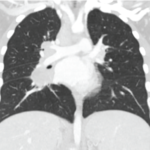WASHINGTON (Reuters)—U.S. President Donald Trump called on Congress on Thursday to pass legislation to protect patients from surprise medical bills from out-of-network doctors that can unnecessarily cost patients tens of thousands of dollars. In remarks at the White House, Trump unveiled principles the administration will send to congressional lawmakers to incorporate into a legislative package…
The ACR/CHEST ILD Guidelines in Practice, a video
In collaboration with the American College of Chest Physicians, the ACR released two new comprehensive guidelines aimed at improving the screening, monitoring, and treatment of patients with interstitial lung disease (ILD) secondary to systemic autoimmune rheumatic diseases (SARDs). Recently, Sindhu R. Johnson, MD, PhD, professor of medicine at the University of Toronto, Canada, director of the Toronto Scleroderma Program and principal investigator for the guideline, and Elana J. Bernstein, MD, MSc, Florence Irving associate professor of medicine in the Division of Rheumatology at Columbia University, New York City, and co-first author, presented a webinar to talk about how the guidelines were developed and present some of the recommendations and their rationale: Watch the recording now!
How Does Health Literacy Affect the Patient Global Assessment?
For RA patients, a low score on the patient global assessment of disease activity as measured by a visual analog scale (PGA-VAS) is necessary to confirm remission. However, limited patient health literacy combined with the complexity of the scale may result in discrepancies between the PGA-VAS and provider assessments of disease activity. New research examined the patient perspective on the PGA-VAS and its connections to health literacy and disease state…
ACR Leaders to Meet with Members of Congress
On May 16, ACR and ARP leaders serving on the Board of Directors, Affiliate Society Council, Government Affairs Committee, Committee on Rheumatologic Care, RheumPAC and Insurance Subcommittee will go to Capitol Hill to advocate on behalf of the College’s membership and our patients. The group represents 31 states and the District of Columbia, and will…
ACR Issues Position Statements on Key Rheumatology Issues
The ACR recently issued three new position statements on key issues facing rheumatologists and patients with rheumatic diseases: step therapy, affordable prescription drug pricing and a special waived test designation for synovial fluid crystal analysis performed by rheumatologists. Here is a detailed look at each. Addressing Step Therapy Step therapy or fail first protocols require patients…
Chronic Opioid Use in Rheumatoid Arthritis: Prevalence & Predictors
Over the past decade, physicians, patients and policy makers have expressed increasing concern about the high frequency of opioids being prescribed and the association between opioid use and poor outcomes. Rates of opioid prescriptions in the general population rose considerably from the 1990s through 2010, with a plateau in the early 2010s. In 2015, 38%…

Advocacy Up Close: Dr. Gary Bryant Discusses the Role & Benefits of RheumPAC
RheumPAC, the ACR’s political action committee (PAC), is tasked with fundraising, vetting legislators, participating in Capitol Hill visits and developing important relationships for the College. During my interview with Gary Bryant, MD, the ACR’s inaugural RheumPAC chair, he shared his thoughts on the role of rheumatology advocacy in advancing clinical practice, research and education. ACR@Work: Have…

Why Fellows Should Care about ACR Advocacy
As a physician, I am an advocate. I am an advocate for my patients individually and collectively, and I am an advocate for my field: pediatric rheumatology. My own experiences as a patient drive me to integrate my patients’ perspectives into my medical decision making, and although my academic training has prepared me to best…

New Research Foundation Award Supports the Future of Rheumatology
The workforce shortage in rheumatology is a critical issue the Rheumatology Research Foundation is tackling. The number of patients with rheumatic disease is growing exponentially, and that means more health professionals and innovative approaches are needed to ensure rheumatology practices are set up to offer the best care. In 2018, the ARP released a core…

Ethics Forum: Patient Safety at Home—What Are Our Legal & Ethical Responsibilities?
A 60-year-old woman with a six-month history of retroperitoneal fibrosis transfers her care to you. She initially presented with severe bilateral flank pain radiating to the abdomen and chest. A computerized tomography (CT) angiogram of the abdomen demonstrated an infrarenal abdominal aortic aneurysm surrounded by a thick inflammatory rind entangling the left renal vein and…

The RISE Registry Delivers Practice-Based Evidence to Rheumatologists
The advent of quality-based healthcare, such as the Medicare Access and CHIP Reauthorization Act of 2015 (MACRA), requires rheumatology professionals to demonstrate their practice is based on interventions supported by the best available evidence and that their practice, in turn, provides quality care. These requirements have increased the need for methods to measure and quantify…
- « Previous Page
- 1
- …
- 80
- 81
- 82
- 83
- 84
- …
- 251
- Next Page »
